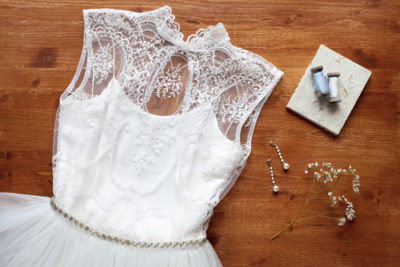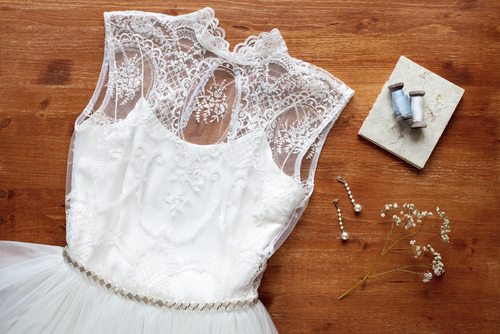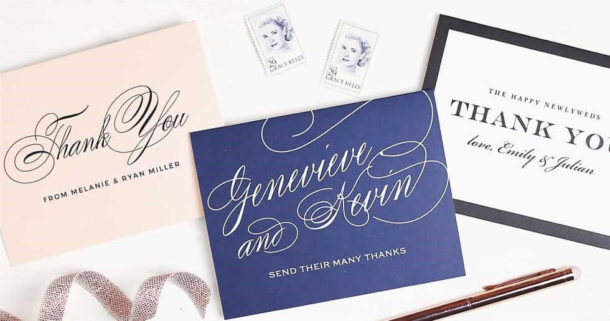New brides shopping for the perfect wedding dress are sometimes unaware of the number of things to know about wedding dress fabrics. Design, color, cut, and cost are often the primary concerns when choosing your dress. It’s important, however, to understand that your fabric choice can impact everything from the way your gown photographs to your overall comfort on the big day.

Each different type of fabric brings its own advantages and drawbacks. Some things to consider include:
- Fabric weight
- Breathability
- Tendency to wrinkle
- Transparency
- Durability
- Thickness
The Top Three Things to Know About Wedding Dress Fabric
There are many things to know about wedding dress fabric, but you don’t need to become an expert. These easy tips will help you understand your options and make a great choice.
Tip #1: Lightweight Fabrics Are Better for Spring and Summer Weddings
When planning a wedding in the spring or summer, try to opt for a more lightweight fabric. This will be especially important if you plan to spend time outdoors during the ceremony, reception, or for family photos. Rayon, crepe, and batiste are all excellent summer wedding gown choices.
Rayon
Rayon is a popular fabric that is often used in place of silk. It’s more lightweight and safer to wear in the summer heat. A drawback of rayon is that it’s more prone to wrinkles than some other fabrics. This may be a concern when taking outdoor photos.
Crepe
This material is soft, thin, and crinkly by design. There’s no need to worry about wrinkles when wearing a crepe gown. The material tends to cling tightly to your curves, making these dresses a little more form-fitting. However, due to it’s delicate nature crepe can prone to snags and tears.
Batiste
A very soft and somewhat transparent fabric, batiste is often woven into cotton or linen. It can be used to create a gorgeous homemade look and is popular among brides seeking a victorian or vintage design.
Tip #2: Choose Heavier Materials for Fall and Winter Weddings
Fall and winter weddings bring cooler temperatures and a wider variety of fabrics choices. Some of the most popular winter bridal gown materials are silk, brocade, and faille.
Silk
Soft and luxurious, silk is also one of the more expensive wedding gown fabrics. This timeless classic is beautiful and elegant. Heavier silks are usually not recommended during the warm summer months as it can be too warm to wear comfortably and can cause excess perspiration at a time you want to feel as cool and calm as possible.
Brocade
This heavy material is woven with ornate raised designs. It has a long history of being used for high-end clothing and tends to add an element of formality to wedding gowns.
Faille
Glossy, finely ribbed, and sturdy enough to create structured designs, faille is a favorite of winter brides. This material reflects light beautifully, making it perfect for winter weather photos.
Tip #3: There Truly Are No Rules
The most important things to know about wedding dress fabric is that there is no right or wrong answer. While some fabrics are better suited to certain environments, most brides agree that design is a far more important priority.
When shopping for your gown, keep an open mind and don’t limit yourself. There truly are no rules. Nothing matters more than looking in the mirror and knowing you’re ready to say ‘yes to the dress’.
Once you’ve found your dream gown, you will want to keep it looking as beautiful as the first day you saw it. Plan to have your wedding dress professionally cleaned and preserved soon after your wedding so it remains pristine for generations to come.








